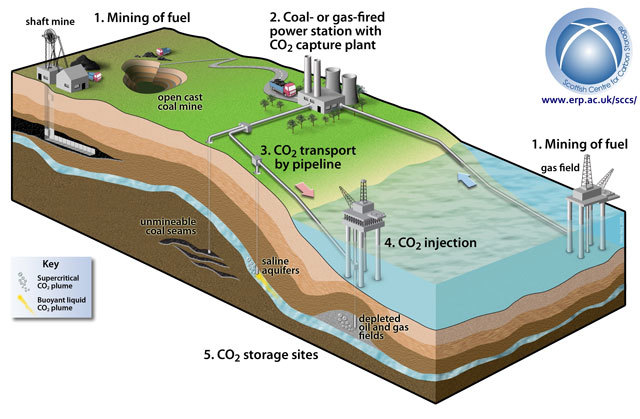
The effects of greenhouse gases are beyond dispute. The more CO2 there is in the atmosphere, the warmer the planet becomes.
Every tonne of carbon we burn adds 3.7 tonnes of CO2. A coal-fired power station produces one to three million tonnes of CO2 per year.
There is no magic solution, but something that could make a big difference as we transition to a lower carbon economy is carbon capture and storage (CCS).
This involves capturing CO2 when it is produced, transporting it and injecting it into a deep repository such as a depleted offshore oil reservoir.
The technology to do this is relatively well understood, although we continue to make improvements. The largest obstacles to implementation are political, economic and legal.
To respond to this situation, Aberdeen University has set up a multidisciplinary group of engineers, scientists, geologists, environmentalists, lawyers and economists. This allows us to tackle the issues as a whole, ensuring that solutions developed in one field fit into the bigger picture.
The University’s CCS group has recently joined the Scottish Carbon Capture and Storage initiative, which includes around 100 experts from the University of Edinburgh, Heriot-Watt University and the British Geological Survey, and is the biggest dedicated group of its kind in the UK.
A key finding of our work so far is that governments need to take a longer-term approach to this issue.
There may be no short-term economic benefit to setting up expensive CCS projects, but the cost of not taking action is unthinkable.
The US is already ahead in the deployment of CCS, and President Obama’s recent announcement of ambitious emission reduction targets for 2030 implies much more will follow. China, Canada, and Australia are all pressing forward with CCS and Europe needs to do likewise.
The Peterhead and White Rose (North Yorkshire) CCS projects are at the feasibility study stage, but more needs to be done . . . and quickly . . . if Europe is to keep pace with the rest of the world.
A possible brake on the political will to make progress is a lack of public understanding of what CCS involves:
Will it cause earthquakes?
Could gas leak into the ocean?
We need real and effective public engagement to allay these fears.
Academics have a duty to share their work with people in language they understand.
We don’t want to dictate “the truth” as we see it, just share the information without arrogance or jargon.
Once people understand what it’s all about, we are confident they will support the case for the implementation of CCS.
The north-east of Scotland is well-placed to benefit from CCS also in terms of jobs and prosperity.
With transferable expertise and skills from the oil and gas industry readily to hand, Aberdeen could become a European CCS hub.
At the University, we have acquired £1million worth of cutting-edge equipment to advance our understanding of the CCS process.
We have the expertise, we have the technology. It’s time to make CCS happen.
Dr David Vega-Maza is
leader of the University of Aberdeen’s Carbon Capture and Storage Group
Recommended for you
